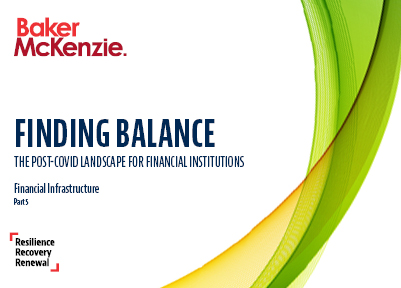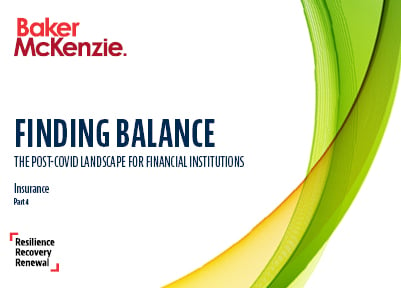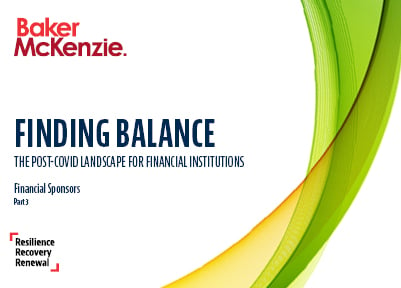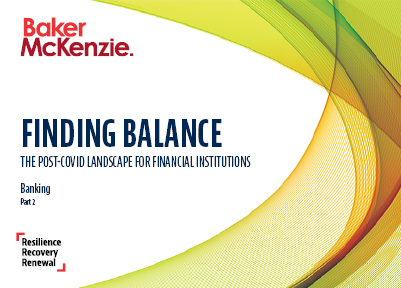COVID-19 represents one of the greatest ever shocks to our economies and, in consequence, to the business models of financial institutions and the way they do business. While many changes to business processes and operations were already taking place prior to the pandemic, COVID-19 has given many added impetus and urgency. Decision-makers must choose between adapting a wait-and-see approach or implementing more proactive strategies to safeguard and, if possible, grow their businesses.
In recent months many lawyers, consultants, academics and commentators have spoken and advised on the immediate impact of lockdown and business interruption, and a great deal of time has been spent by several organizations telling businesses what they already know about current circumstances. Not enough time or thought has been committed to other compelling questions.
Finding Balance: The Post-COVID Landscape for Financial Institutions seeks to map the post-pandemic environment that financial institutions need to navigate as we move to the new normal. We look at how different industry sectors are experiencing profoundly distinct impacts on their balance sheets and markets, with very different timescales and pinch points. We also consider how the global economy will be impacted directly and indirectly in the years ahead. Drawing on analysis and resources from beyond the legal sector — media commentary, economic analysis, consultancy, political insight — and reflecting our clients’ own views on what’s happening to their businesses in various jurisdictions and areas of business, Baker McKenzie’s legal experts consider the challenges and opportunities that lie ahead for financial institutions.
Over the coming weeks, in this series of briefings, our experts will discuss their expectations for each of four industry subsectors: (1) banking, (2) insurance, (3) financial sponsors: asset management, private equity and sovereign wealth funds and (4) financial market infrastructure. We also take a look at five of the industry’s most compelling trends — (1) rising global indebtedness, (2) shadow banking, (3) increasing regulatory scrutiny, (4) impact of new technology and (5) sustainable financial institutions — and analyze how COVID-19 is impacting them.
Financial Infrastructure
Financial institutions rely upon market infrastructure to ensure the provision of financial services. While this subsector is very diverse, for this installment, we will focus on financial infrastructure providers (FIPs) such as exchanges, clearers and depositaries, as well as payment providers and systems. To date, the subsector has shown itself to be resilient in light of the stresses from COVID-19.
Over recent years, it has been highly acquisitive with increasing levels of leverage resulting from in-market consolidation or growing ancillary business lines. Digitalization and fintech are also transforming business models. Big tech is investing heavily in payment products in partnership with established payment firms and in emerging market economies with less tradition of banking.
Read our fifth installment and listen to the accompanying podcast featuring Sue McLean, a partner in our London office. Sue provides a deeper look into FIPs and touch on important considerations related to digitalization, as they plan their respective renewal strategies.
Insurance
Despite fears early on in the crisis that COVID-19 could be the most expensive insurance event ever, insurers encountered relatively moderate business disruption and travel insurance claims, although there is scope for higher payouts and litigation in the future.
Existing trends such as digitalization and ESG have received new impetus from COVID-19, accelerating change significantly. Productivity has not grown in the sector since the 2008 financial crisis with premium growing less than GDP. Digitalization and insurtech will reduce future costs, providing the opportunity to improve profitability but requiring investment. While climate change poses significant risks to the prudential soundness of insurers, it is creating badly needed opportunities for insurers as long-term investors – if issues around prudential regulation can be resolved.
Read our fourth installment and listen to the accompanying podcast featuring Martin C.W. Tam, a partner in our Hong Kong office. Martin talks about trends, developments, and key considerations for insurance companies, as they plan their respective renewal strategies.
Financial Sponsors – Private Equity/Credit Funds, Asset Management, and Sovereign Wealth Funds
At a high level, while organizations are still relatively well capitalized and liquid, the position could deteriorate. Financial sponsors have, to date, demonstrated considerable resilience during the pandemic. In the case of private equity managers, after initially focusing on portfolio company triage, most have now turned their attention back to investing, adapting their approach to deal making in light of the new realities of travel restrictions and government lockdowns.
Clearly, however, there are sectors of the market — retail, hospitality, luxury goods, energy, healthcare services, office and retail real estate — which continue to suffer. For managers investing heavily in these segments, the road to recovery will be slow. Questions remain as to how much support private equity and other real asset funds will need to provide to their portfolio companies and assets, with those in the worst affected sectors of the economy incurring significant losses and/or liquidity constraints during lockdown.
Read our third installment and listen to the accompanying podcast featuring Michael J. Fieweger, a partner in our Chicago office. Mike talks about observations and key considerations for financial sponsors as they plan their respective renewal strategies.
Banking – Retail, Commercial and Investment
The trends that the sector faced pre-COVID-19 — increasing global indebtedness, the growth in shadow banking, the disruptive but innovative impact of new technologies and the move to a more sustainable economy — have all been accelerated. Moreover, in the aftermath of a crisis, enforcement and compliance activity usually increases. There is the analogy of the tide going out to reveal wrongdoing that was hidden by as-usual business activity. This means that while such activity is currently low — in part because supervisors are focusing on other priorities (e.g., ensuring customers are protected, that markets continue to function well, financial stability and the availability of liquidity) — this is likely to change quickly when business begins to recover.
Read our second installment and watch the accompanying video featuring Karen H. Y. Man, a partner at our Financial Services Group. Karen talks about our findings and addresses key considerations for banks in planning their renewal strategies.
Setting the Scene
Financial institutions must now navigate not only an economy in recession, but one where COVID-19 is disrupting business models and accelerating existing trends such as digitalization and the importance of environmental, social and governance factors.
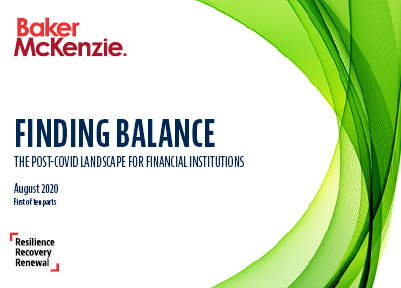 Read our introductory publication and listen to the accompanying podcast featuring Jonathan Peddie, Global Chair of the Financial Institutions Industry Group, being interviewed by Ying Yi Liew, a local partner and an expert in our financial services practice from the Singapore office. They talk about our findings and address some tough questions businesses need to ask and consider in planning their renewal strategies.
Read our introductory publication and listen to the accompanying podcast featuring Jonathan Peddie, Global Chair of the Financial Institutions Industry Group, being interviewed by Ying Yi Liew, a local partner and an expert in our financial services practice from the Singapore office. They talk about our findings and address some tough questions businesses need to ask and consider in planning their renewal strategies.

